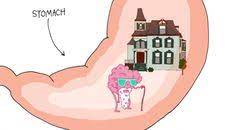
Chewing Gum Digestion: How Long Does Swallowed Gum Stay in Your Stomach?
Chewing gum has been a beloved pastime for ages, but there’s a prevalent myth claiming it stays in your stomach for an astounding seven years. Let’s unravel the truth behind this misconception and delve into the fascinating process of chewing gum digestion, clarifying the realities often obscured by the misleading notion. Understanding how the stomach processes gum can provide valuable insights into debunking this persistent seven-year myth.

The idea that chewing gum stays in your stomach for seven years is a popular myth that has been circulating for many years. However, it is completely false. Chewing gum is not digested like other foods, but that does not mean it remains in your stomach for an extended period. This belief has caused concern among many individuals, leading them to question the safety and potential health risks associated with chewing gum.
The Digestive Process: Breaking Down Chewing Gum

To understand why the claim that chewing gum stays in your stomach for seven years is false, it is essential to grasp the basics of the digestive process. When you consume food or drink, it travels through your esophagus and enters the stomach. Here, powerful acids and enzymes work together to break down the ingested material into smaller components that can be absorbed by the body. Chewing gum, on the other hand, is made up of a combination of synthetic rubber, sweeteners, flavorings, and softeners. When you swallow chewing gum, it travels through your digestive system just like any other food. However, because gum contains indigestible substances such as rubber or latex, it passes through the stomach and small intestine without being broken down or absorbed. Instead, it moves relatively quickly through your digestive tract and is eventually eliminated from your body. While it may take longer to break down than other foods, it does not remain in your stomach indefinitely. The stomach’s acidic environment and digestive enzymes gradually break down the gum’s components, just as they do with any other food.
The Journey through the Digestive System

It is worth noting that swallowing large amounts of gum or swallowing it along with other indigestible objects can lead to gastrointestinal issues, such as blockages. However, this is a result of the quantity or combination of substances involved and not because the gum itself remains in your stomach for an extended period. Once the gum has been partially broken down in the stomach, it moves into the small intestine. Here, the remaining components are further broken down and absorbed into the bloodstream. The body then utilizes these nutrients for energy and other essential functions. While some components of chewing gum may resist complete digestion, they do not accumulate in the stomach or intestines. Instead, they pass through the digestive system relatively quickly, just like any other food. The undigested portions of gum, such as the synthetic rubber base, are eventually eliminated from the body through bowel movements.
The Myth’s Origins and Lack of Scientific Evidence

The notion that chewing gum stays in your stomach for seven years likely stems from a misunderstanding or exaggeration of the gum’s digestion process. Over time, this myth has been perpetuated through word of mouth and popular culture, leading many to believe it as fact. However, scientific evidence does not support this claim. Numerous studies have been conducted to investigate the digestion of chewing gum, and none have found evidence to suggest that it remains in the stomach for an extended period. In fact, research has consistently shown that gum passes through the digestive system within a few days, similar to other food items. While it is true that chewing gum is not broken down and digested in the same way as other foods, it does not stay in your stomach or intestines for seven years or any significant length of time. In reality, gum typically passes through your system within a few days to a week, similar to the transit time of other food items.
The Importance of Moderation and Proper Disposal

While chewing gum does not stay in your stomach for seven years, it is still essential to consume it in moderation. Excessive gum chewing can lead to various issues, such as jaw pain, tooth decay, and digestive discomfort. Additionally, swallowing large amounts of gum in a short period may cause blockages in the digestive tract, although this is extremely rare. To ensure proper disposal and minimize any potential risks, it is crucial to dispose of used gum in appropriate receptacles. Avoid spitting it out on the ground or sticking it under tables or chairs. By doing so, you not only contribute to a cleaner environment but also reduce the chances of accidental ingestion by yourself or others.
In summary, the myth that chewing gum stays in your stomach for seven years is untrue. While it is not digested like other foods, chewing gum passes through your digestive system relatively quickly and is eventually eliminated from your body, typically within a few days to a week. The claim that chewing gum stays in your stomach for seven years is nothing more than a persistent myth. The digestive process effectively breaks down gum’s components, allowing them to pass through the body within a few days. While moderation is key when it comes to gum consumption, there is no need for undue concern about long-term retention in the stomach. By understanding the facts and disposing of gum responsibly, we can enjoy this popular pastime without any unnecessary worries.
Disclaimer: The information provided in this content is for general informational purposes only. It is not intended as medical or healthcare advice, diagnosis, or treatment. Always seek the advice of a qualified healthcare professional with any questions you may have regarding a medical condition or healthcare decisions.
















